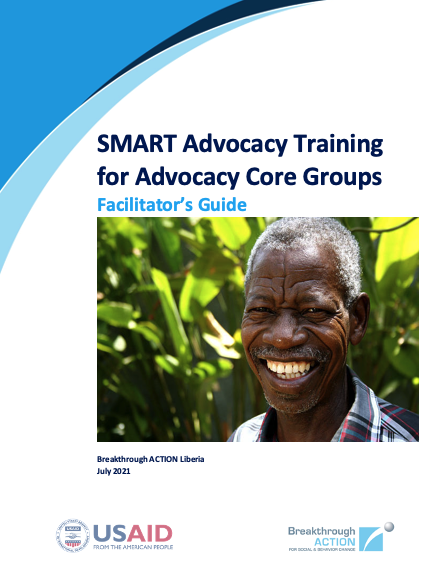SMART Advocacy Training Facilitator’s Guide
This facilitator’s guide was produced to train Health Advocacy Committees (HAC) as part of Breakthrough ACTION Liberia’s overall capacity development and implementation of community-based advocacy core groups. It offers conceptual and in-depth methodologies, tools, and step-by-step guidance to individuals who will facilitate SMART (Specific, Measurable, Attainable, Relevant, and Time-Bound) Advocacy training specific to HACs across project locations.
The manual is structured into four modules with a general training preparation section:
General Training Preparation: This section presents the specific activities facilitators will need to complete prior to the training. It also includes the overall introduction and opening of the training session. Additionally, this section provides the opportunity for participants and facilitators to get to know each other, agree on norms of the workshop, set and clarify expectations and objectives, and understand participants’ prior knowledge of the training content. This section will build trust and set the pace for the rest of the training modules and sessions.
Module One: This module provides an overview of the Breakthrough ACTION Liberia project. In this module, participants will get an overview of the project, as well as the community group concept, the process and importance of group formation and working in a team, and the roles and responsibilities of the HACs. By completing this module, participants will develop an appreciation of the concept of the HAC and identify and develop skills for dealing with the challenges associated with community group work.
Module Two: This module presents the overall concept of SMART advocacy. The module is intended to provide participants with an in-depth understanding of advocacy, the definition of advocacy, its importance, approaches, and the qualities and skills of an advocate. Further, the module provides relevant tools that enable participants to identify advocacy issues; conduct stakeholder analyses; address oppositions including myths, misconceptions, and mindset; develop advocacy messages; and effectively communicate these messages. Finally, the module explores strengthening capacity for effective stakeholders’ engagement and coordination, determining advocacy results, and monitoring and evaluation in advocacy.
Module Three: This module aims to provide information on the accountability and management of HACs. It provides an opportunity to reflect on steps to ensure HACs’ sustainability and the importance of documentation and report writing. Further, participants will have the opportunity to establish a county-level HAC and its leadership and develop a work plan for the HAC.
Module Four: This module aims to provide a comprehensive analysis of the training outcomes. Activities under this module include administering the training post-test, conducting the final evaluation, and closing the sessions. Both facilitators and participants will have the opportunity to give and receive overall feedback on the training.
Date of Publication: May 12, 2022

